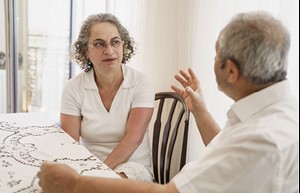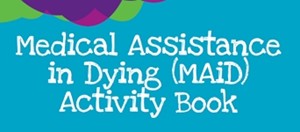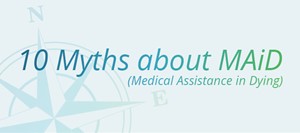Telling family and friends
“It was so hard to find the words at first to tell my wife I wanted MAiD … I didn’t want her to think that I wanted to leave her. There were lots of tears, and we both feel sad, but I feel such relief.”
You might be wondering how to tell your family and friends. Talking about death and dying is hard, and many people are uncomfortable with the subject. It can be even harder to talk about a medically assisted death. It is your choice who in your life you want to know about your decision. Some people want everyone to know. Others feel it is a private matter, and only want their family to know, or just one other person.
You probably have a sense if there is someone in your life who may have strong opposition to your request, and you may or may not choose to tell them.
You are in control of this. If you would like help talking to family or friends, reach out to your health care team or the MAiD office.
Resources
One way to start might be to say:
“There is something important I want to talk with you about.”
You might follow up with:
“I am not sure how you will feel about this, but I want you to know my thoughts and wishes.”
This sets the tone and alerts the person to pay attention and that emotionally difficult information may be forthcoming. This “preparation” can be helpful to the person you are talking to. You might pause to see that you have their attention before continuing. You might say
“I have been suffering for some time with____”
or
“I am worried that I am going to suffer in the future because___” .
or
“Did you know that medically assisted dying is now legal in Canada? They call it MAiD.”
Share with them how long you have been thinking about it, why you would like it, and how you are suffering. Let them know whether you are wanting to have MAiD as soon as you can, if you have a date in mind, or if it is something you would like to have as an option for down the road. If it is true for you, tell them you are feeling a sense of relief that MAiD is a possibility.
You may be worried this will upset them, or that they will become emotional, and this will trigger your own sadness and other feelings. Even if they can see your suffering, and support your request for an assisted death, they will likely be sad at the thought of your death, as may you, at the thought of leaving them.
You may be wondering if your family or friends will “judge” you for making this request. Most people, whether they agree with assisted death or not, support the right of the person to make their own decisions. The people who love and care about you do not want to see you suffer. Often when friends and family have a chance to talk with you about your thoughts and feelings, they respond with support and understanding.
“After seeing how much pain she was in, and hearing how she was suffering, I realized that it wasn’t about my own perceptions and hopes for my mom. It’s about how I can love and support her in any way possible, including her decision to have MAiD.”
When you learned about the person’s incurable condition, you may have had feelings of grief almost immediately. You may have been experiencing losses all along and struggling as you have witnessed their suffering.
Hearing how they have been suffering and why they would like an assisted death has likely brought you an even deeper understanding of what they have been going through. You may have mixed feelings of sadness and relief just as they do. Having this conversation may have led to other deep conversations about your relationship and what you mean to one another.
You might feel shocked that they are considering this and have a feeling that “everything is happening too fast”, and that you don’t have enough time to prepare yourself. You might feel anger, resentment, disappointment, betrayal, or abandonment. Remember that the person isn’t choosing to have an incurable illness, and/or declining health, but rather choosing to end their suffering, and for many to gain some control over their situation.
Resources
- Grief and Medical Assistance in Dying (MAiD) - MyGrief.ca learning module
Videos
More Articles

What is MAiD?

The application process for MAiD

Why do people consider MAiD?

Talking to children and youth about MAiD

Starting a conversation about MAiD with the person who is ill

Seeking information and starting the process

Capacity and consent and why they are important

Having the assessments

Choosing when and where

Planning for the time left

Planning the day of MAiD

A medically assisted death

Grief after a medically assisted death

For healthcare providers
Featured Content

Understanding MAiD for individuals and families
Read More
MAiD Activity Book for Kids
Read More
Understanding MAiD for healthcare providers
Read More
Infographic - Q&A about MAiD
Read More
MyGrief.ca Module - Grief and Medical Assistance in Dying (MAiD)
Read More


